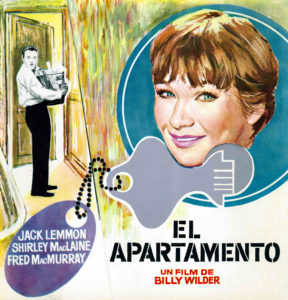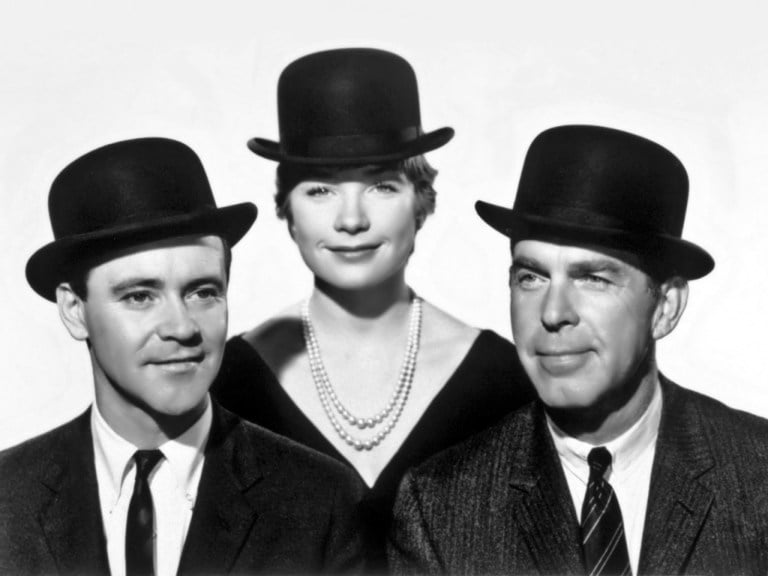Star-wise, humor-wise and emotion-wise, there are few films that can match “The Apartment,” playing at the Stanford Theatre this Friday, Saturday and Sunday at 5:15 and 9:35 p.m.
Everything about Billy Wilder’s 1960 romantic comedy is so perfectly constructed — not a shot wasted, not a beat missed. Its tight-rope marriage of vulgar laughs and suicidal melancholia works better than it has any right to.
So what’s it about? We’ll let Wilder’s one-sentence summary speak for itself:
“This is about a young fellow [Jack Lemmon] who gets ahead in a big company by lending his apartment to executives for that grand old American folk ritual — the afternoon shack-up.”
Reportedly, those were the only words Shirley MacLaine needed to accept the part of Lemmon’s love interest. Wilder would also call it “a dirty fairy-tale about the price of success”: Lemmon has to do a lot of sucking-up to secure his high position at the firm. When his boss (Fred MacMurray) double-crosses him, will he still accept the American dream?
Acting-wise, this is one of the most elegant comedies in American moviedom. It is a film graced with endless moments for actors to jam within small, tightly-choreographed grooves: Jack squirts his nasal drips across the wide-screen, Shirley twirling an egg-roll with her pinky. Both noble losers. Each bit player chips away the hard-edged vision of New York as a cesspool for ad execs and proto-venture capitalists. From Jack Kruschen’s kindly Jewish doctor to Hope Holiday’s lonely souse spending New Year’s Eve without her Cuba-imprisoned husband (“Do you like Castro?” she memorably asks Jack), not since Vincente Minnelli’s “The Clock” (1945) had a Hollywood film offered such a beautifully up-and-downbeat vision of the city.
For me, though, one moment towers above all the rest. It’s Christmas. A raucous holiday party is being thrown at Consolidated Life, the firm where Lemmon (C.C. “Bud” Baxter) works and nurses a crush on MacLaine, the elevator girl with the boss pixie cut (Fran Kubelik). Baxter races to the elevator, carrying two cups of liquor — one for him, one for Miss Kubelik. He rarely drinks, but on Christmas with Miss Kubelik, he breaks his informal vow.
The dialogue in a Wilder romance-comedy has a musky, snappy, American feel to it that is never flat-footed and always keenly aware of story and the players’ chemistry. In the elevator, Miss Kubelik apologizes to Baxter for the night before. Nice guy that he is, he shrugs it off. “You couldn’t help yourself.” She’s less adamant: “It’s unforgivable.” “I forgive you!” “Well, you shouldn’t.” Bashful Baxter, ever the assuaging office-drone, is genuinely happy: “Ya did the only decent thing.” Miss Kubelik, her ire increasing, pushes the point, wants him to understand that, no, what she did last night wasn’t right. She pitches some Wilder wordplay his way: “Well, I wouldn’t be too sure. Just ‘cause I wear this uniform, that don’t make me a Girl Scout.” Finally, he curiously asserts himself in a delivery for the ages: “Miss Kubelik, one doesn’t get to be a Second Administrative Assistant around here unless he’s a pretty good judge of character. And as far as I’m concerned, you’re tops. Decency-wise, or… otherwise-wise! (tiny guffaw) Cheers!”
Pause on that guffaw. Listen to it again and again and once more. Worlds turn around that guffaw. Every time I hear Lemmon’s guffaw, I truly, honestly get chills. A slight tear wells in my eye. Here, Lemmon proves beyond a shadow of a doubt that a deep movie character doesn’t rest in the big gestures. What makes someone come alive are the minor moments. Those crisp nods when Baxter watches a ticker-tape click his life away. The mock-operatic grandeur of the nonsense Italian song he bellows, as he cooks spaghetti for himself and — finally, finally! — romantic company (Miss Kubelik). Baxter’s guffaw is otherworldly. It’s a laugh that says, “I’ll try to be happy, even though this party is more crowded than a subway at rush hour, even though everyone’s having fun except me and my love. I’ll try to look happy, just this once.”
But embedded in the guffaw is an infuriating naïvité and gullability — Baxter’s fatal flaw. He is both refreshingly decent and irritatingly complacent. He doesn’t lift skirts like the other chauvinist male workers, yes, but he doesn’t try to criticize or discourage it. He’s chained to the American concept of success-at-any-cost — don’t speak out or risk offending those around you — being liked is the ultimate. It takes Miss Kubelik to take him out of that turtle shell, and vice versa.

You may watch a Wilder film and come out of it feeling good, or just dandy, or even slightly cold. But I guarantee — you spend enough time with the Wilder, focused intensely on character gesture, delivery, pitch, movement, framing of camera around the actor — and you’ll come out of it with a whole new appreciation for every bitter person’s nuance. For this is a cinema that shuns elaborate camera movements — virtuoso in Welles, Ophuls, Preminger, etc., but far too distracting for a hard-boiled prose director like Wilder. His is a cinema that cares first and foremost about the actor — the star — the shiny soul in Baxter’s black-and-white blue eyes.
Jack Lemmon was the secret ingredient, the organic tenderness, that Wilder needed in his cinema. He first worked with Lemmon on 1959’s “Some Like it Hot.” Dissatisfied with the way he treated Jack’s character in that picture (stuck with the horny old man while Marilyn Monroe got Tony Curtis), Wilder made Lemmon the center of six of his subsequent films, including ”The Fortune Cookie” (1966) and his late-period masterwork “Avanti!” (1972). In “The Apartment,” Lemmon was made the moral center of the Wilder universe. Lemmon was able to curb Wilder’s enthusiasm for the jaded, perverse and cynical. Lemmon was so effective as Wilder’s conscience that when he played a total bastard in “Avanti!,” the polar opposite of C.C. Baxter, it didn’t come off as a bad thing. Rather, somehow, the audience knew that this asshole’s cartoonish anger would soon melt into Lemmon-y Snickers. Yes — even Wendell Armbruster, Jr., (“Avanti!”‘s pathetic, angry bulldog of a lead man) inched his way to C.C. Baxter territory in a space of 144 minutes — thanks to the Italian location, slow pacing, sharp Wilder/I.A.L. Diamond script and a never-better Juliet Mills.
Billy Wilder’s New York is oddly accurate despite being shot entirely in a studio set. Wilder always preferred the comfort of a set of having to finagle an on-location shoot. He disliked his beautiful “Avanti!” because, in his words, “it smelled like it was shot in Italy.” (It was — and Jonathan Rosenbaum rightly notes this is its strength, since the real-Italian locations add to the romantic, authentic air of the picture.) Despite Wilder’s anti-location bias, he was, like Vincente Minnelli’s NYC of “The Clock,” obsessed with getting every detail right inside. Baxter’s apartment is authentically lived-in: down to the marks where matches have been struck right above the oven, the pieces of chewing gum underneath the sofa and the cheap borderline-kitsch reproductions of famous paintings in the bedroom. (Baxter is a lazy fan of Rousseau’s “Sleeping Gypsy” and Picasso’s “Three Musicians.”) The Oscar-winning set and interior designs (by production designer Alex Trauner) are filled with dejection, tiredness and crisp starchiness: the perfect pad for a loser loner like Buddy Boy.
Wilder renders Baxter’s living-space with palpable loneliness, thanks to his signature wide-shots. Wilder apparently struggled with his cinematographer Joe LaShelle, who was used to working with TV directors who leaned heavily on the close-up to frame the actors’ movements. Wilder, by contrast, hated close-ups, using them only when necessary — and even then, skipping past them as soon as possible. He prefers to let the camera hang back from a distance, observing the players move naturally about in an undisturbed space. The CinemaScope stretchiness of Wilder’s shots only adds to the isolating feeling that Baxter’s apartment is too big for him. At night, we can understand why he started lending it out to other guys; if he’s not going to have fun in it, maybe he should let others. A character mark of both tremendous generosity and naïveté; but then again, that’s the sweet and sour of Wilder’s characters, who he treats with alternate coldness and warmth, contempt and empathy, condescension and humbleness.
In a New York City as antiseptic as Wilder’s, Lemmon’s C.C. Baxter and MacLaine’s Fran Kubelik are breaths of fresh air. They give NYC its human charm — which it doesn’t lack, of course, but which is simply forgotten in its sardine-packed rush of people going from place to place, in the adulterous-lecherous-opportunist air of the capitalist office. The city can be cripplingly lonely. But Baxter and Kubelik are committed to find a private human connection, to be the exception in a city where everyone is also trying to be the exception.
“The Apartment” was nominated for ten Oscars in 1961 and won five, including Best Picture, Best Director for Billy Wilder, Best Original Screenplay (Wilder and I.A.L. Diamond), Best Film Editing and Best Art & Set Decoration for a Black-and-White Film.
Contact Carlos Valladares at cvall96 ‘at’ stanford.edu.
